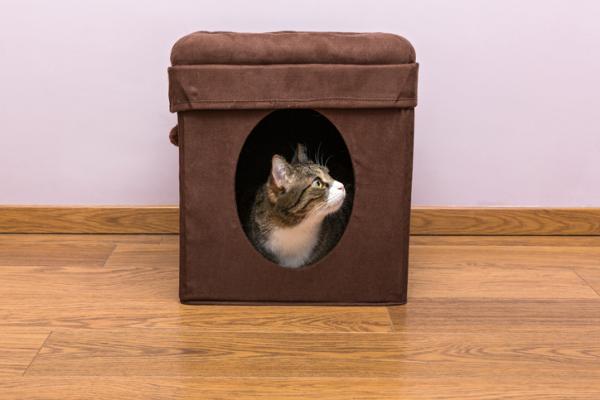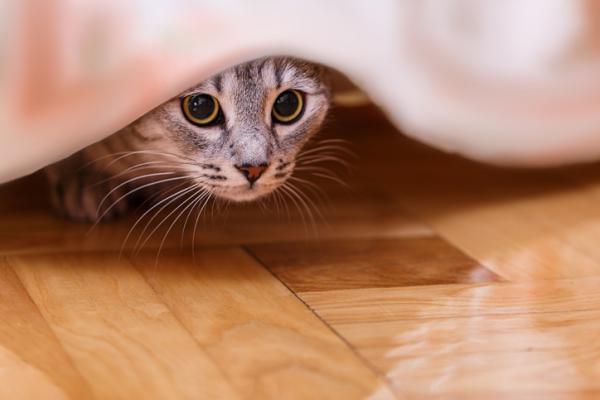Why do cats hide in dark places?

Surely, you have already observed that your pussycat he loves to hide in dark places and, not rarely, choose to rest in unusual places or difficult to reach. Many times, the cats hide to have fun or just to rest easy. However, a cat can also isolate itself when they feel fear or as a symptom of stress and some pathologies.
Do you want to know why your cat is hiding in dark places? Then, you entered the ideal page. In this new article, we will explain the main causes of this feline behavior and how you can act to certify the good health of your companion.
Why do cats hide?
El habit of hiding It is part of the behavior of felines. A healthy cat can hide when it wants to play hide and seek with its owner or to enjoy only a toy that pleases him. In other circumstances, your pussycat may want to take a good nap away from the sun’s rays, especially on the hottest days. And if you have visualized a small insect in your environment, you can also use an environment with low luminosity to prepare the perfect attack (remember that cats see better in the gloom than in clarity).
However, it is important that the owners remain attentive to changes in behavior of your pussycat If a cat begins to hide very often, this can be a negative sign that indicates some imbalance in your body. It is also recommended that you know the feline body language to recognize the postures and expressions that may indicate a disorder in the health of your partner.
Next, we summarize the main negative causes what can you do with your cat hiding in dark places:
- Negative and / or slightly stimulating environment: a cat can hide as a symptom of boredom, which usually appears when it is exposed to a sedentary routine in an un-stimulating environment. This occurs most frequently in the kittens that are left alone for a long time and do not have an enriched environment to stimulate their body and mind.
- Stress: a cat exposed to high levels of stress can hide to find a quiet environment, as well as experience a series of behavioral changes. It is crucial to be aware of the symptoms of stress in your pussycat and quickly consult the veterinarian you trust by identifying them in your kitty.
- Poor socialization: many adult cats were not properly socialized when puppies, so they did not learn to relate properly with other animals and people. If your cat hides in dark places when you receive visitors at home, it is likely that he is avoiding coexistence with these individuals who, for him, “disturb the tranquility of their territory.”
- Critical period of socialization: if you had to adopt a baby cat separated prematurely from your mother or newborn, you will have to guide your little one during his critical period and, at the same time, key to his socialization (between his 4 and 12 weeks of life). Naturally, the kitten should learn, during this period, to relate to their environment and other individuals gradually, together with their parents and siblings.
- Process of adaptation to a new homeIf you recently adopted a baby or adult pussycat, your new partner may be hiding because he is not yet adapted to the new home and he is afraid to expose himself to stimuli and unknown places. In these cases, you must have patience and respect the adaptation times of your feline. It is also important to offer a quiet environment, stimulate their curiosity and reward their demonstrations of courage by allowing them to get out of hiding little by little.
- Fear: Cats are also afraid and this feeling allows them to be attentive and escape from possible threats in their environment. It is very common for cats to hide when they hear loud noises or when they see objects that associate disturbances with their auditory tranquility (the vacuum cleaner, the blender, the hair dryer). The cat senses are very sensitive and easily perceive stimuli that go completely unnoticed. Therefore, if your pussycat runs and hides, pay attention to its environment to identify the possible cause.
- TraumasThis is also a frequent cause in the adopted kittens that were born or were abandoned in inhospitable places, like the streets. It is possible that your feline has gone through negative experiences that involve some noise, object or other animals. By identifying the presence of something that, in your rationing, represents your risk to your well-being, your cat will look for a safe refuge, probably in a dark and difficult to access place. It is very important that you have the help of a professional expert in feline ethology to help your kitty to overcome his traumas.
- Homes with 2 or more cats: Adopting a companion for your cat can be an excellent alternative to keep you physically and mentally active during your absence, as well as stimulate your social capacity. However, it is crucial that the felines well socialized before imposing a coexistence. Cats are territorial by nature and can easily reject the presence of another animal in their home. Therefore, if you decide to adopt a new kitten for your home, remember to present it correctly to your cat.
- Death: it was very present in the popular belief that cats hid when they were preparing to die. In fact, when they are close to death, felines feel more vulnerable and look for a safe environment if they can be calm. Therefore, if a cat is already an old man or has an illness, it may be hidden in dark places and difficult to access as a sign that it is about to leave.

The importance of ruling out pathological causes
Some pathologies that cause acute pain, affect the senses or unbalance the metabolism (hormonal problems, for example), can cause behavioral changes and promote the development of phobias and traumas in cats. Therefore, we highlight the importance of consult your trusted veterinarian to observe any change in the behavior of your feline. In the veterinary clinic, the professional will perform the appropriate studies to rule out possible pathological causes and certify the health status of your kitten.
Also note that cats can hide in unusual places to detect the presence of fleas, mites or other pathogens. These small parasites usually stay in carpets, pillows and behind surfaces “mats” where they can camouflage, reproduce and go unnoticed. Remember to respect the vaccination letter and periodic deworming of your pussycat, as well as reinforcing the hygiene of your home, to avoid an infestation of ectoparasites and the diseases that can cause in your feline.
What can I do to help my cat?
First, it is essential that you consult your trusted veterinarian to find out the cause of your pussycat’s abnormal behavior. If your cat hides in dark places for natural reasons, you will not need to offer a treatment. Nor should you force him out of hiding or disturb him while he is calm. It is important to respect the personality of our cats and the freedoms essential for their well-being.
If you need your cat to come out of hiding for some reason, you should not yell at it or try to grab it. This exposes the animal to a high index of unnecessary stress and favors the development of self-defensive behaviors. Simply act serenely and try to attract him by stimulating his curiosity, using his favorite toy or candy.
In the event that a pathology is diagnosed, the veterinarian will advise you on the most appropriate treatment for your kitten. Whether it is a psychological or emotional disorder, it will be crucial to have the guidance of a expert in ethology or feline education. These professionals will be able to base the treatment of your pussycat on specific guidelines that help you to recover your self-confidence to express yourself in a healthy and balanced way.
You can also follow the following guidelines to take care of your pussycat and avoid the development of behavioral problems:
- Offer an adequate preventive medicine: the first thing you should do to help your cat is to offer him adequate preventive medicine throughout his life. Visit the veterinarian every 6 months, respect the letter of vaccination and periodic deworming, maintain a balanced diet of high quality, daily exercise your body and mind, and take care of their hygiene. All this will allow your feline to maintain excellent health, in addition to being able to find out and quickly deal with any imbalance in his organism.
- Positive and enriched environment: It is important that you know the value of environmental enrichment for your pussycat. This will keep you physically and mentally stimulated, even when you are not at home, and avoid the symptoms of stress and boredom. Do not forget to have several sandboxes, toys, catwalks and feline structures that will keep you stimulated, while modifying them.
- Socialization: all domestic cats can and should be properly socialized to learn to relate to people, animals and other stimuli of their environment. Therefore, if you adopted a baby feline or adult, remember to socialize to avoid behavioral problems.

If you want to read more articles similar to Why do cats hide in dark places?, we recommend that you enter in our behavior problems section.


